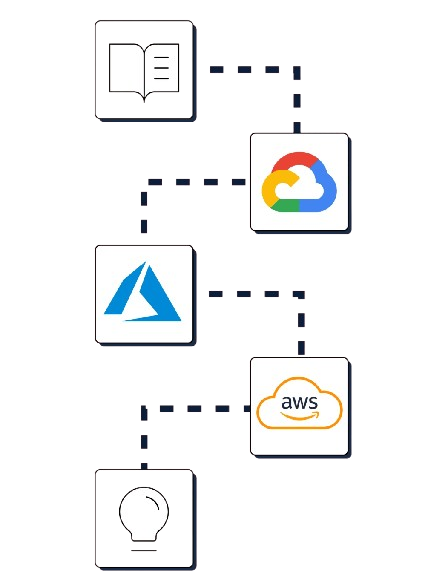Data Engineer
The Data Engineering course at Dhanutek Soft Solutions is designed to provide participants with comprehensive knowledge and hands-on experience in modern data engineering tools, technologies, and methodologies. The course spans six weeks, covering fundamental to advanced concepts essential for a successful career as a data engineer. Participants will engage in practical exercises and a final capstone project to build a complete data pipeline using Databricks and Snowflake.
Course Contents
-
Week 1: Introduction to Data Engineering and Basics
Day 1: Overview of Data Engineering
- Role of Data Engineer: Understanding responsibilities in a data pipeline.
- Tools and Technologies: Overview of essential tools and platforms.
- Real-World Applications: Examples of how data engineering supports businesses.
Day 2: Introduction to Databases
- Relational Databases (RDBMS): Structure and purpose of relational databases.
- SQL Basics: Core concepts like data types, tables, and schemas.
Day 3-4: SQL Fundamentals
- SELECT Statements: Retrieve data from tables.
- WHERE Clauses & Joins: Filter and combine data from multiple tables.
- Aggregations & Groupings: Summarize data using GROUP BY and aggregate functions.
- Subqueries & CTEs: Write reusable queries for complex data retrieval.
Day 5: NoSQL Databases
- Types of NoSQL: Key-value, document, and columnar databases.
- MongoDB Basics: Introduction to the popular NoSQL database.
Day 6-7: Data Modeling
- Conceptual, Logical, & Physical Models: Design data models at different levels.
- ER Diagrams & Normalization: Visualize and optimize database structure.
Week 2: Data Storage and ETL Processes
Day 8: Introduction to Data Warehousing
- OLTP vs. OLAP: Differences between transaction processing and analytical processing.
- Data Warehouse Architecture: Design and layers of a data warehouse.
Day 9-10: Data Integration and ETL
- What is ETL?: Extract, transform, and load data into target systems.
- Hands-on ETL Tools: Practice with Apache Nifi or Talend.
Day 11-12: Snowflake Basics
- Snowflake Introduction: Overview of the cloud-based data warehouse.
- Account Setup: Steps to set up a Snowflake account.
- Virtual Warehouses: Key elements of Snowflake’s architecture.
Day 13-14: Batch Processing Basics
- Introduction to Hadoop: Distributed storage and processing framework.
- Data Movement: Data transfer with Sqoop and Flume.
Week 3: Programming for Data Engineering
Day 15-16: Python for Data Engineering
- File Handling: Manage files with Python.
- Data Manipulation: Use Pandas for data cleaning and transformation.
- JSON & CSV Processing: Extract and process data from various file formats.
Day 17-18: Introduction to APIs
- REST APIs: Extract and integrate external data sources.
- API Hands-On: Practical exercise to extract data from APIs.
Day 19-20: Big Data Frameworks (Apache Spark)
- Introduction to Spark: Framework for large-scale data processing.
- Writing Spark Jobs: Build and run Spark jobs with PySpark.
Day 21: Introduction to Databricks
- Overview of Databricks: Unified data analytics platform.
- Environment Setup: Set up Databricks for development.
Week 4: Advanced Data Engineering Concepts
Day 22-23: Stream Processing
- Apache Kafka: Stream processing and message queuing.
- Real-Time Pipelines: Create real-time data pipelines with Kafka.
Day 24-25: Data Lake Concepts
- What are Data Lakes?: Large storage repositories for unstructured data.
- Build Data Lake: Use AWS or Azure to create a data lake.
Day 26: Snowflake Advanced Features
- Time Travel & Cloning: Recover and clone Snowflake data.
- Data Sharing & Security: Share and secure Snowflake data.
Day 27-28: Orchestration Tools
- Apache Airflow: Orchestrate workflows for data pipelines.
- Workflow Management: Create, schedule, and manage workflows.
Week 5: Deep Dive into Databricks and Snowflake
Day 29-30: Databricks for Big Data Processing
- Notebook Management: Develop and manage Databricks notebooks.
- Spark Job Optimization: Optimize Spark jobs for better performance.
Day 31-32: Data Engineering in Snowflake
- SQL Scripting: Write Snowflake SQL for transformations.
- Snowpipe Pipelines: Automate data loading with Snowpipe.
Day 33-34: Data Partitioning and Optimization
- Partitioning: Strategies for efficient data storage and retrieval.
- Delta Lake: Optimize storage with Delta Lake in Databricks.
Day 35: Databricks and Snowflake Integration
- Connecting Databricks to Snowflake: Integrate platforms for seamless data flow.
- Build End-to-End Pipeline: Create a data pipeline from Databricks to Snowflake.
Week 6: Final Project and Career Preparation
Day 36-40: Capstone Project
- Full Data Pipeline: Build a pipeline with APIs, Databricks, and Snowflake.
- Data Cleaning: Clean and transform data using Databricks.
- Load Data: Load cleaned data into Snowflake.
- Perform Analysis: Use Databricks SQL for analysis and insights.
Day 41-42: Resume Building and Interview Preparation
- Portfolio Creation: Showcase key projects and skills.
- Interview Questions: Common data engineering questions and how to answer them.
Day 43-45: Mock Interviews and Project Presentation
- Capstone Presentation: Present your project to a panel.
- Feedback Session: Receive feedback to improve project and interview readiness.

The Data Engineering course at Dhanutek Soft Solutions equips participants with the skills and knowledge to become proficient data engineers. Covering essential topics like SQL, NoSQL, ETL, Snowflake, Databricks, and orchestration tools, this program blends theoretical concepts with hands-on experience. By the end of the course, participants will have built an end-to-end data pipeline and honed their technical and presentation skills to stand out in job interviews. This course lays a solid foundation for a successful career in data engineering.
